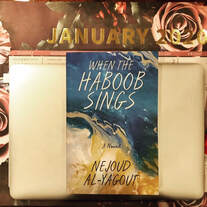|
by Rana Asfour The author, Nejoud Al-Yagout, spins a psychologically charged tale, 'When the Haboob Sings', around the consequences individuals in a hypocritical society face when they dare to be themselves or to say what they think. All it took in the case of the novel’s protagonist, Dunya Khair, was one article –an ‘unsafe’ one – to create an uproar in a society dominated by its male counterparts, used to shuttering away female dissent. Ironically, when her controversial article is published, it barely causes a ripple in the echelons, until a male cleric responds to it, propelling her into notoriety. She is faced with the dissolution of familial ties, the collapse of her sham marriage, a looming nervous breakdown and solitary imprisonment in a filthy cell where readers meet her for the first time at the start of the book. The author’s cautionary tale is set in an unnamed Arab country although the general themes in the novel are most assuredly universal – gender equality, sexuality, patriarchy and religion. The author succeeds in creating the dramatic tension that ensues when one woman dares to break from the mold and air the dirty laundry. It is then that we see the violent backlash of a society that appears to the West as progressive with a ruling family that is known to be ‘très modern’.
What did not work in the novel for me was that the first person narrative limited the story to the narrator’s perspective. We were only privy to what Dunya was thinking and saying and how the world was reacting from her point of view alone. No other voices were there to corroborate her story or to defy it. Even when her far from perfect family blew hot and cold, we had no clue as to their personal journeys leading to their changed attitudes except for what Dunya was telling us. For such weighty issues as those the book deals with, there should have been more dialogue and more points of view so we don’t end up with pockets of one-sided repetitive psycho-babble. That said, fully immersing the reader into the machinations of Dunya’s thought process and emotional roller coaster, her beliefs, desires, hates and love, has the effect of creating a haboob – a dust storm – an act that feels intimate and claustrophobic, disquieting and disorienting all at the same time. Readers feel everything Dunya feels and ultimately they become her, caught in the whirl and twirl of the stormy events of her life, dizzied and disoriented. The aftermath of this 207-page ‘Haboob’ is that readers, those like me still reeling from the book’s ending, will have a hard time shaking off ‘the story of a woman whose unshakeable resolve to preserve her authenticity costs her more than she ever imagined’.
0 Comments
Your comment will be posted after it is approved.
Leave a Reply. |
Archives
March 2021
|





 RSS Feed
RSS Feed
